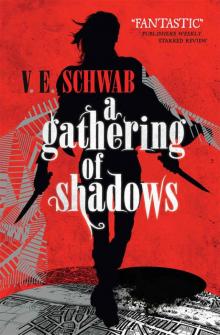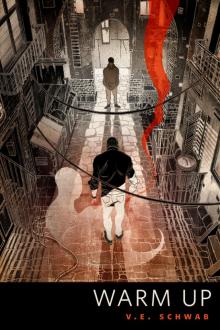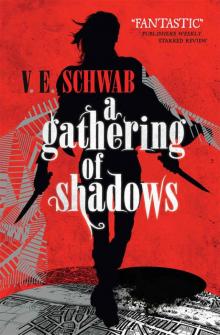- Home
- V. E. Schwab
Gathering of Shadows (A Darker Shade of Magic)
Gathering of Shadows (A Darker Shade of Magic) Read online
Contents
Cover
Also by V.E. Schwab
Title Page
Copyright
Dedication
Epigraph
I: Thief at Sea
I
II
III
IV
V
II: Prince at Large
I
II
III
IV
V
III: Changing Tides
I
II
III
IV
V
VI
IV: Londons Calling
I
II
III
IV
V
V: Royal Welcome
I
II
III
IV
V
VI
VII
VI: Impostors
I
II
III
IV
V
VII: Intersections
I
II
III
IV
V
VIII: The Essen Tasch
I
II
III
IV
V
VI
VII
IX: Collision Course
I
II
III
IV
V
VI
X: Catastrophe
I
II
III
IV
V
VI
VII
VIII
IX
Acknowledgments
About the Author
Also by V.E. SCHWAB and available from TITAN BOOKS
Vicious
A Darker Shade of Magic
This Savage Song (June 2016)
A GATHERING OF SHADOWS
A Gathering of Shadows
Print edition ISBN: 9781783295425
E-book edition ISBN: 9781783295432
Published by Titan Books
A division of Titan Publishing Group Ltd
144 Southwark Street, London SE1 0UP
First Titan edition: February 2016
10 9 8 7 6 5 4 3 2 1
Names, places and incidents are either products of the author’s imagination or used fictitiously. Any resemblance to actual persons, living or dead (except for satirical purposes), is entirely coincidental.
V.E. Schwab asserts the moral right to be identified as the author of this work.
Copyright © 2016 V.E. Schwab
No part of this publication may be reproduced, stored in a retrieval system, or transmitted, in any form or by any means without the prior written permission of the publisher, nor be otherwise circulated in any form of binding or cover other than that in which it is published and without a similar condition being imposed on the subsequent purchaser.
A CIP catalogue record for this title is available from the British Library.
For the ones who fight their way forward
Magic and magician must between them balance. Magic itself is chaos. The magician must be calm. A fractured self is a poor vessel for power, spilling power without focus or mea-sure from every crack.
TIEREN SERENSE,
head priest of the London Sanctuary
I
THE ARNESIAN SEA
Delilah Bard had a way of finding trouble.
She’d always thought it was better than letting trouble find her, but floating in the ocean in a two-person skiff with no oars, no view of land, and no real resources save the ropes binding her wrists, she was beginning to reconsider.
The night was moonless overhead, the sea and sky mirroring the starry darkness to every side; only the ripple of water beneath the rocking boat marked the difference between up and down. That infinite reflection usually made Lila feel like she was perched at the center of the universe.
Tonight, adrift, it made her want to scream.
Instead, she squinted at the twinkle of lights in the distance, the reddish hue alone setting the craft’s lanterns apart from the starlight. And she watched as the ship—her ship—moved slowly but decidedly away.
Panic crawled its way up her throat, but she held her ground.
I am Delilah Bard, she thought as the ropes cut into her skin. l am a thief and a pirate and a traveler. I have set foot in three different worlds, and lived. I have shed the blood of royals and held magic in my hands. And a ship full of men cannot do what I can. I don’t need any of you.
I am one of a damned kind.
Feeling suitably empowered, she set her back to the ship, and gazed out at the sprawling night ahead.
It could be worse, she reasoned, just before she felt cold water licking her boots and looked down to see that there was a hole in the boat. Not a large hole by any stretch, but the size was little comfort; a small hole could sink a boat just as effectively, if not as fast.
Lila groaned and looked down at the coarse rope cinched tight around her hands, doubly grateful that the bastards had left her legs free, even if she was trapped in an abominable dress. A full-skirted, flimsy green contraption with too much gossamer and a waist so tight she could hardly breathe and why in god’s name must women do this to themselves?
The water inched higher in the skiff, and Lila forced herself to focus. She drew what little breath her outfit would allow and took stock of her meager, quickly dampening inventory: a single cask of ale (a parting gift), three knives (all concealed), half a dozen flares (bequeathed by the men who’d set her adrift), the aforementioned dress (damn it to hell), and the contents of that dress’s skirts and pockets (necessary, if she was to prevail).
Lila took up one of the flares—a device like a firework that, when struck against any surface, produced a stream of colored light. Not a burst, but a steady beam strong enough to cut the darkness like a knife. Each flare was supposed to last a quarter of an hour, and the different colors had their own code on the open water: yellow for a sinking ship, green for illness aboard, white for unnamed distress, and red for pirates.
She had one of each, and her fingers danced over their ends as she considered her options. She eyed the rising water and settled on the yellow flare, taking it up with both hands and striking it against the side of the little boat.
Light burst forth, sudden and blinding. It split the world in two, the violent gold-white of the flare and the dense black nothing around it. Lila spent half a minute cursing and blinking back tears at the brightness as she angled the flare up and away from her face. And then she began to count. Just as her eyes were finally adjusting, the flare faltered, flickered, and went out. She scanned the horizon for a ship but saw none, and the water in the boat continued its slow but steady rise up the calf of her boot. She took up a second flare—white for distress—and struck it on the wood, shielding her eyes. She counted the minutes as they ticked by, scouring the night beyond the boat for signs of life.
“Come on,” she whispered. “Come on, come on, come on …” The words were lost beneath the hiss of the flare as it died, plunging her back into darkness.
Lila gritted her teeth.
Judging by the level of the water in the little boat, she had only a quarter of an hour—one flare’s worth of time—before she was well and truly in danger of sinking.
Then something snaked along the skiff’s wooden side. Something with teeth.
If there is a god, she thought, a celestial body, a heavenly power, or anyone above—or below—who might just like to see me live another day, for pity’s or entert
ainment’s sake, now would be a good time to intercede.
And with that, she took up the red flare—the one for pirates—and struck it, bathing the night around her in an eerie crimson light. It reminded her for an instant of the Isle River back in London. Not her London—if the dreary place had ever been hers—or the terrifyingly pale London responsible for Athos and Astrid and Holland, but his London. Kell’s London.
He flashed up in her vision like a flare, auburn hair and that constant furrow between his eyes: one blue, one black. Antari. Magic boy. Prince.
Lila stared straight into the flare’s red light until it burned the image out. She had more pressing concerns right now. The water was rising. The flare was dying. Shadows were slithering against the boat.
Just as the red light of the pirate’s flare began to peter out, she saw it.
It began as nothing—a tendril of mist on the surface of the sea—but soon the fog drew itself into the phantom of a ship. The polished black hull and shining black sails reflected the night to every side, the lanterns aboard small and colorless enough to pass for starlight. Only when it drew close enough for the flare’s dying red light to dance across the reflective surfaces did the ship come into focus. And by then, it was nearly on top of her.
By the flare’s sputtering glow, Lila could make out the ship’s name, streaked in shimmering paint along the hull. Is Ranes Gast.
The Copper Thief.
Lila’s eyes widened in amazement and relief. She smiled a small, private smile, and then buried the look beneath something more fitting—an expression somewhere between grateful and beseeching, with a dash of wary hope.
The flare guttered and went out, but the ship was beside her now, close enough for her to see the faces of the men leaning over the rail.
“Tosa!” she called in Arnesian, getting to her feet, careful not to rock the tiny, sinking craft.
Help. Vulnerability had never come naturally, but she did her best to imitate it as the men looked down at her, huddled there in her little waterlogged boat with her bound wrists and her soggy green dress. She felt ridiculous.
“Kers la?” asked one, more to the others than to her. What is this?
“A gift?” said another.
“You’d have to share,” muttered a third.
A few of the other men said less pleasant things, and Lila tensed, glad that their accents were too full of mud and ocean spray for her to understand all the words, even if she gleaned their meaning.
“What are you doing down there?” asked one of them, his skin so dark his edges smudged into the night.
Her Arnesian was still far from solid, but four months at sea surrounded by people who spoke no English had certainly improved it.
“Sensan,” answered Lila—sinking—which earned a laugh from the gathering crew. But they seemed in no hurry to haul her up. Lila held her hands aloft so they could see the rope. “I could use some help,” she said slowly, the wording practiced.
“Can see that,” said the man.
“Who throws away a pretty thing?” chimed in another.
“Maybe she’s all used up.”
“Nah.”
“Hey, girl! You got all your bits and pieces?”
“Better let us see!”
“What’s with all the shouting?” boomed a voice, and a moment later a rail-thin man with deep-set eyes and receding black hair came into sight at the side of the ship. The others shied away in deference as he took hold of the wooden rail and looked down at Lila. His eyes raked over her, the dress, the rope, the cask, the boat.
The captain, she wagered.
“You seem to be in trouble,” he called down. He didn’t raise his voice, but it carried nonetheless, his Arnesian accent clipped but clear.
“How perceptive,” Lila called back before she could stop herself. The insolence was a gamble, but no matter where she was, the one thing she knew was how to read a mark. And sure enough, the thin man smiled.
“My ship’s been taken,” she continued, “and my new one won’t last long, and as you can see—”
He cut her off. “Might be easier to talk if you come up here?”
Lila nodded with a wisp of relief. She was beginning to fear they’d sail on and leave her to drown. Which, judging by the crew’s lewd tones and lewder looks, might actually be the better option, but down here she had nothing and up there she had a chance.
A rope was flung over the side; the weighted end landed in the rising water near her feet. She took hold and used it to guide her craft against the ship’s side, where a ladder had been lowered; but before she could hoist herself up, two men came down and landed in the boat beside her, causing it to sink considerably faster. Neither of them seemed bothered. One proceeded to haul up the cask of ale, and the other, much to Lila’s dismay, began to haul up her. He threw her over his shoulder, and it took every ounce of her control—which had never been plentiful—not to bury a knife in his back, especially when his hands began to wander up her skirt.
Lila dug her nails into her palms, and by the time the man finally set her down on the ship’s desk beside the waiting cask (“Heavier than she looks,” he muttered, “and only half as soft …”) she’d made eight small crescents in her skin.
“Bastard,” growled Lila in English under her breath. He gave her a wink and murmured something about being soft where it mattered, and Lila silently vowed to kill him. Slowly.
And then she straightened and found herself standing in a circle of sailors.
No, not sailors, of course.
Pirates.
Grimy, sea stained and sun bleached, their skin darkened and their clothes faded, each and every one of them with a knife tattooed across his throat. The mark of the pirates of the Copper Thief. She counted seven surrounding her, five tending to the rigging and sails, and assumed another half dozen below deck. Eighteen. Round it up to twenty.
The rail-thin man broke the circle and stepped forward.
“Solase,” he said, spreading his arms. “What my men have in balls, they lack in manners.” He brought his hands to the shoulders of her green dress. There was blood under his nails. “You are shaking.”
“I’ve had a bad night,” said Lila, hoping, as she surveyed the rough crew, that it wasn’t about to get worse.
The thin man smiled, his mouth surprisingly full of teeth. “Anesh,” he said, “but you are in better hands now.”
Lila knew enough about the crew of the Copper Thief to know that was a lie, but she feigned ignorance. “Whose hands would those be?” she asked, as the skeletal figure took her fingers and pressed his cracked lips to her knuckles, ignoring the rope still wound tightly around her wrists. “Baliz Kasnov,” he said. “Illustrious captain of the Copper Thief.”
Perfect. Kasnov was a legend on the Arnesian Sea. His crew was small but nimble, and they had a penchant for boarding ships and slitting throats in the darkest hours before dawn, slipping away with their cargo and leaving the dead behind to rot. He may have looked starved, but he was an alleged glutton for treasure, especially the consumable kind, and Lila knew that the Copper Thief was sailing for the northern coast of a city named Sol in hopes of ambushing the owners of a particularly large shipment of fine liquor. “Baliz Kasnov,” she said, sounding out the name as if she’d never heard it.
“And you are?” he pressed.
“Delilah Bard,” she said. “Formerly of the Golden Fish.”
“Formerly?” prompted Kasnov as his men, obviously bored by the fact she was still clothed, began to tap into the cask. “Well, Miss Bard,” he said, linking his arm through hers conspiratorially. “Why don’t you tell me how you came to be in that little boat? The sea is no place for a fair young lady such as yourself.”
“Vaskens,” she said—pirates—as if she had no idea the word applied to present company. “They stole my ship. It was a gift, from my father, for my wedding. We were meant to sail toward Faro—we set out two nights ago—but they came out of nowhere, stormed the Golden F
ish...” She’d practiced this speech, not only the words but the pauses. “They … they killed my husband. My captain. Most of my crew.” Here Lila let herself lapse into English. “It happened so fast—” She caught herself, as if the slip were accidental.
But the captain’s attention snagged, like a fish on a hook. “Where are you from?”
“London,” said Lila, letting her accent show. A murmur went through the group. She pressed on, intent on finishing her story. “The Fish was small,” she said, “but precious. Laden down with a month’s supplies. Food, drink … money. As I said, it was a gift. And now it’s gone.”
But it wasn’t really, not yet. She looked back over the rail. The ship was a smudge of light on the far horizon. It had stopped its retreat and seemed to be waiting. The pirates followed her gaze with hungry eyes.
“How many men?” asked Kasnov.
“Enough,” she said. “Seven? Eight?”
The pirates smiled greedily, and Lila knew what they were thinking. They had more than twice that number, and a ship that hid like a shadow in the dark. If they could catch the fleeing bounty … she could feel Baliz Kasnov’s deep-set eyes scrutinizing her. She stared back at him and wondered, absently, if he could do any magic. Most ships were warded with a handful of spells—things to make their lives safer and more convenient—but she had been surprised to find that most of the men she met at sea had little inclination for the elemental arts. Alucard said that magical proficiency was a valued skill, and that true affinity would usually land one gainful employment on land. Magicians at sea almost always focused on the elements of relevance—water and wind—but few hands could turn the tide, and in the end most still favored good old-fashioned steel. Which Lila could certainly appreciate, having several pieces currently hidden on her person.
“Why did they spare you?” asked Kasnov.
“Did they?” challenged Lila.
The captain licked his lips. He’d already decided what to do about the ship, she could tell; now he was deciding what to do about her. The Copper Thieves had no reputation for mercy.
“Baliz …” said one of the pirates, a man with skin darker than the rest. He clasped the captain’s shoulder and whispered in his ear. Lila could only make out a few of the muttered words. Londoners. Rich. And ransom.

 A Gathering of Shadows
A Gathering of Shadows A Conjuring of Light
A Conjuring of Light Vengeful
Vengeful Warm Up
Warm Up The Near Witch
The Near Witch Vicious
Vicious A Darker Shade of Magic
A Darker Shade of Magic Gathering of Shadows (A Darker Shade of Magic)
Gathering of Shadows (A Darker Shade of Magic)